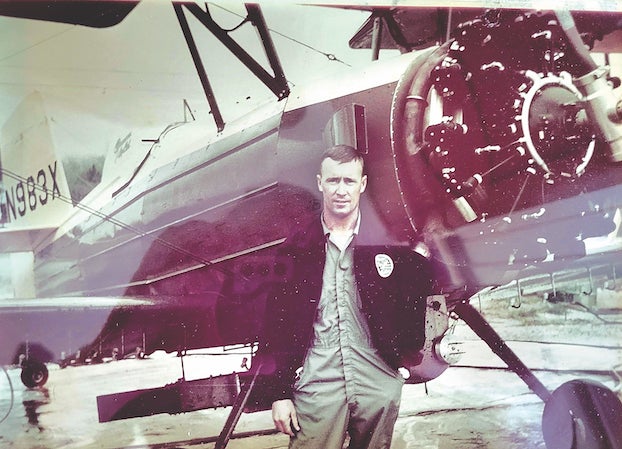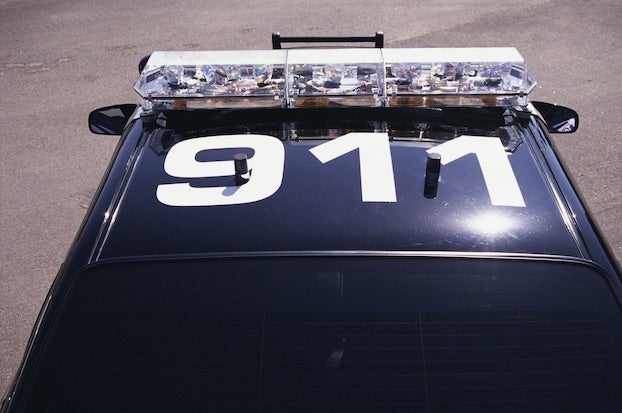‘Cowboy of the Skies’: Bill Precht, 84, recalls his crop dusting days
Published 9:23 am Friday, April 28, 2023

- In 1968, William “Big Billy” Precht flew this AgCat for Lyon Flying Service. (Special to the American Press)
William “Bill” Precht, son of Charles and Ella Mae Flourney Precht, was just a boy when he started helping work his father’s and uncles’ 1,200-acre rice and cattle farm in Sweetlake.
“I knew a long time ago, I wasn’t going to be a farmer,” said the 84-year-old retired crop duster. “It’s hard work.”
His interest was in the pilots who seeded the fields and applied herbicides, insecticides and fertilizer by plane — crop dusters. In earlier times, these pilots used only dry chemicals, thus the name crop duster. Now, agricultural aerial application pilots — as they are called in some circles — deliver mostly liquid products.
“When I went to West Texas, it was nothing for us to get a million and a-half acres of cotton and we’d put out pure methyl parathion.” In the past, pilots not only flew the planes. They also loaded the products. The EPA now restricts how methyl parathion can be used.
“When he got in from work, his clothes reeked of chemicals,” his wife added. In his time, he has sprayed parathion, and furadan, now banned — and he is a lively character in great health.
The name and the chemicals are not the only things that have changed since a 17-year-old Precht pulled down his goggles and flew his topless bi-plane across fields challenged by bugs, the occasional birds’ guts, uncoordinated flag men and the stall of the Pratt & Whitney engine every once in a while.
Precht was 10 when he started flagging. Before GPS and other technology, flag men (really, boys), stood at each end of the field to show the pilot where to lay down the product, advancing a certain number of steps after each pass.
Though farming was hard work, it was work. Precht was still at Hebert and Precht Farms when he finished high school.
“You’d have thought he finished school with straight A’s,” said his wife of 62 years, Bev Lognion Precht, with a chuckle.
They started dating when she was 14. They married when she was 17 and he was 21. He said he may not have learned much in school, but he enjoyed himself, and says it was probably the dyslexia that hindered his academic achievement.
“They just didn’t know about things like that back then. Besides if you would have said a word like that, they would have thought you were cussing.”
She said it might have been his schooling that was to blame. Incredulous that it would be allowed, and at his insistence, she visited him at school one day. “Students were out of their seats, cutting up and flying paper airplanes,” she said. “We would have been expelled at LaGrange for that.”
Bev Precht never, ever, tried to sway her husband to be anything other than a crop duster during his 42-year career, even though she was well aware of the risk involved, not even after two crashes. Precht said he made $700 a month when he began.
Aviation art in motion
Flying low, with wheels almost touching the ground, cropdusters have to pull up quickly and turn sharply at a high rate of speed. Fence posts, hard-to-see guide wires and power lines pose serious hazards, as does stalling aircraft and fatigue after long days and often working for months with no days off.
Precht would not comment on his ability. Experts say that crop dusting is a demanding skill which requires better than average concentration, eyesight and coordination, as the pilot must make several physical adjustments and judgment calls simultaneously.
“The Lord was good to me,” Precht said, “because I guess He knew I couldn’t make a living doing nothing else. I should be dead, to be honest with you. I’m not here because I was so great, okay? It was the Lord, just the Lord.”
His love for the work was heightened by his farming background. “I wanted to help the farmer as much as I could. If I helped him, then he’d keep me in work and I’d keep him in work.”
To get an idea of just how low these pilots go, Precht told a story about an ornery farmer.
“My daddy is in that field. If he throws that flag down, you dump your load and you go home,” the farmer told Precht. The farmer’s father had a big Lab with him and it ran toward the plane every time.
“I said, podner, we gonna meet pretty soon. Second load, I’m going across that field and BOOM. I pulled up, looked back over my shoulder and the dog was laying there. I went back a week later to fertilize the same field and asked, ‘How’s your daddy’s dog?’” The farmer told him that it stayed under the house for about a week and finally came out.
Precht’s parents were not as supportive of his career choice. His father gave him $100 when he graduated, but it was Precht who covered the cost of materials, lessons and fees at McFillen Airfield. Doug McMillan was his instructor. He also took classes in Fort Worth, and received word that he’d passed by telegram.
In addition to the name change and the changes in products, planes have changed over the course of an industry that began in the 1920s. Delta Airlines got its start as crop-dusting company during that time.
After WWII surplus training planes became available for agricultural use and were adapted by the individuals who purchased them. A crop duster could spray 60 to 70 acres an hour compared with 100 acres a day for a tractor-drawn ground sprayer. Precht flew a Stearman and an AgCat.
Radial, internal combustion engines have been replaced with turbine engines, more expensive, but more dependable. Hopper designs and pumps have changed. It is an industry that has evolved from a romanticized cowboy of the skies to a high-tech precision industry. Nevertheless, it continues to be a high-risk occupation.
The Precht’s son William “Billy” Precht, Jr. – usually referred to as Little Billy and his father as Big Billy – bought out his father’s portion of a crop dusting business when his father retired after 42 years to care for his wife who had a stroke.
Little Bill died tragically at the age of 52 in 2013 doing what he loved – flying – but not before he helped establish a method for dropping/planting mangrove propagules by plane. The tight root system of these trees would help protect the eroding coastline. Seeds were generally ocean dispersed without reaching inland areas. The process had never been attempted anywhere in the world and successfully “took root” in 2017.
Precht’s philosophy is, when it is a person’s time to go, it is a person’s time to go.
“You can’t hide from it,” he said. “It could just as well have been an auto accident.”
He said he enjoyed hauling the last load just as much as he loved hauling the very first. The Prechts live in Roanoke. He took up stained glass when he retired and creates beautiful pieces including Tiffany-style lamps and chandeliers.





